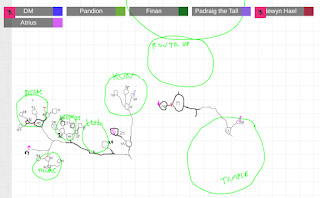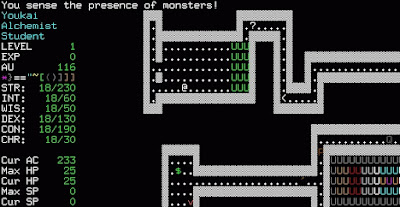As spiders who wait unmoving and noiseless the Gods are in perfect stillness as Sleep approaches their glade. No suppressed chuckle from the Droll Knave; not the merest hiccup from the Skurtch; not even the faintest drip of salt water from the belly of the Trident-Bearer betrays them. Sleep is blind, but Sleep can hear so well that he can even detect the motions of thought itself. The Gods must wait unthinking for him to pass, as stones on a hillside sit dumbly through the winter.
He creeps. His feet pad softly on dewy grass. He sniffs. This way and that. As though swaying his head from side to side like a coursing hound in search of scent. Merely to look on him is to be taken; the Gods hold their eyes shut tightly. Not a cough. Not a wheeze. Not a blink nor a breath. They wait until he circles about their glade, and feel the sun's rays grow warm; by the time he has passed, the light of morning is beginning to gleam through closed eyelids.
Finally the sounds of his movement recede and it is Lap-Laz who speaks first. "Well, brothers and sisters! He is gone. Do we continue?" He drinks from his apricot brandy and dispels anxiety with a belch. "There are many yet to join battle."
Relieved, the Gods crowd once more around the purple. One already stands at the left of the blanket: tall, slender, with long grey feathered wings and tail iridescent and gleaming in the morning sun. Cacomantis, the yellow-footed, black-billed Cuckoo King, whose soft voice has yet to call out in the dawn's games. Now is his time: he unfurls a wing on the blanket and then withdraws it to reveal six giant iridescent green beetles arranged in a line upon the cloth. "These are mine," he declares. "I welcome a challenge."
The Gods murmur their appreciation; Sleep is forgotten. "I will challenge!" calls out the sonorous voice of Hexaich, the River Mother, her hippopotamus head reared in pride, her dozen breasts leaking milk down her belly. She casts three pebbles onto the blanket; they all bounce once, then twice, then come to a rest. Each, as though rousing itself from sleep, sprouts first arms, then legs, and then a grimacing maw beneath tired and mournful eyes. Galeb duhr, resentful of being wakened, and sorrowful at their own vast age. They fixes their misery upon their foes.
Their foes strike first. The beetles lurch forward, spasmodic but fast, and fling themselves upon the rock-men. Mandibles slice and crush, tearing off hunks of rubble; one of the galeb duhr is cracked and gravely weakened, while another loses many fragments of stone-flesh, spraying like grey tears across the purple. The Gods applaud at the resumption of violence - "That's the way!" yells the Skurtch. "Straight at it!" - and Lap-Laz cannot help himself from blurting out, "An upset is on the cards!"
But the galeb duhr's misery now turns to anger. Stone fists pound and swing, cracking carapace like thin clay; it shatters in shards of glimmering green. Beetle bodies jerk and flap amidst ichorous ruin - four are dead, and one of the remainder is sorely wounded. In an instant the battle seems won and lost. Hexaich throws her head back and squeezes jets of milk from her udders in the excitement of impending victory; it squirts in great gushes across the crowd and they cackle and shriek in delighted drunken disgust. For a moment all is chaos of laughter and shouting as they roll and caper on the grass in exaggerated horror; the fight is briefly forgotten until the Elder Sister, her face flushed, her eyes sparkling and stern, cries out "Silence! Children! The fight is not yet over! Remember decorum!"
And certainly it is not. The beetles have earned their name as bombardiers. Both those left alive turn and with deafening blasts spew stinging clouds of steaming, acrid bile at their foes. Each is seared and scarred by the burning sprays, and one is sent reeling, stunned, to slump down to its backside like a sullen, confounded toddler. Hope are raised afresh that the underdog will triumph - Lap-Laz, now carried about by the Droll Knave by piggyback, pours apricot brandy down his gullet and calls out, "Six legs good!" while others among the Gods begin to drum an impromptu rhythm on tree trunks, gourds and bowls to accompany his yells.
But there the contest brutally ends itself before the chant can really gain its momentum. Wounded as they are, the galeb duhr are not to be deterred from visiting their melancholy on their foes. They rend the two last beetles apart and the fight is over.
Cacomantis has been watching affairs aloof. He wipes a drop of milk from his left wingtip with the right, and sniffs. "That was poorly executed. I apologise they offered so little."
Hexaich shrugs. "Life is strong. Unlife is stronger."


